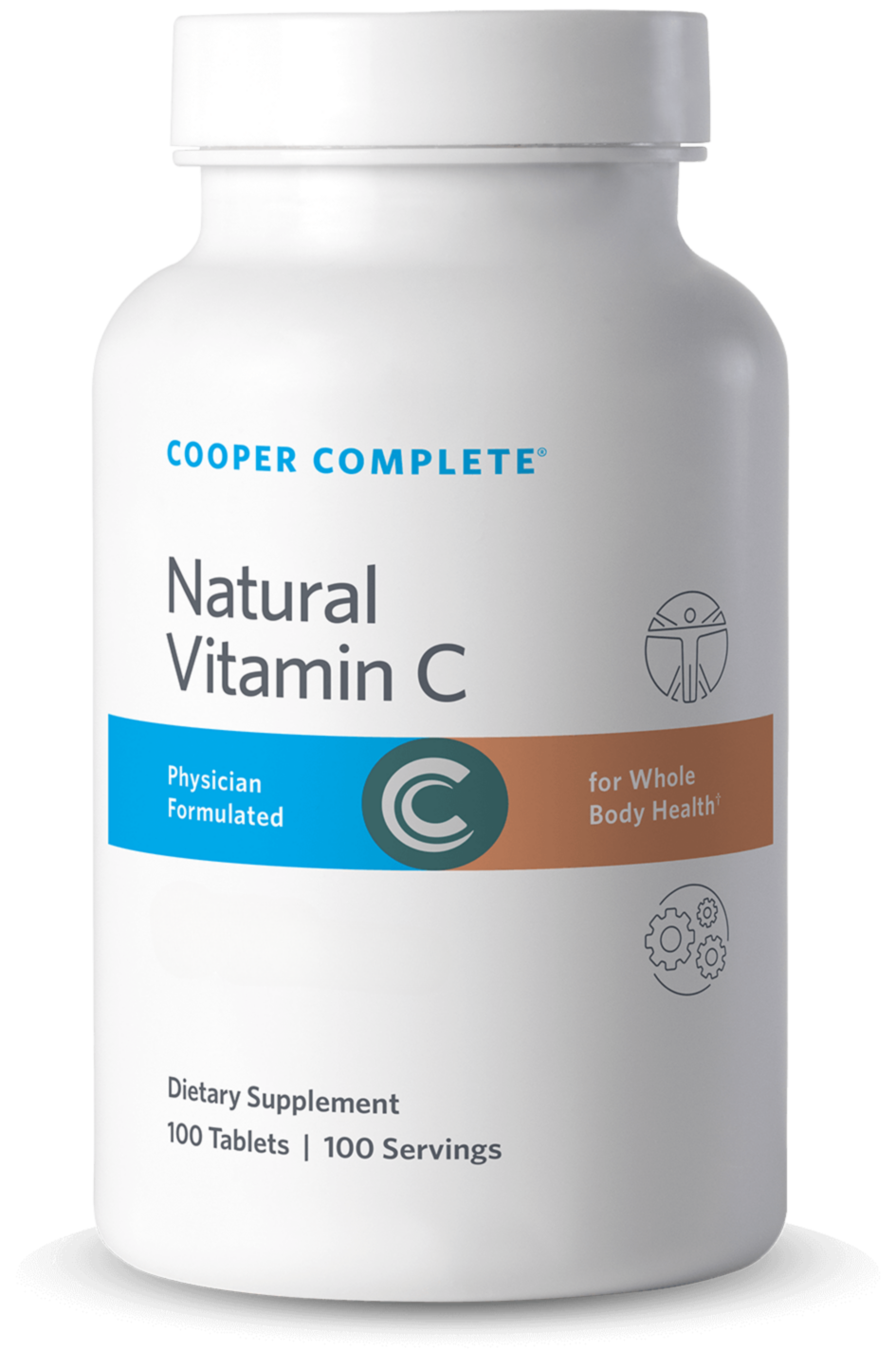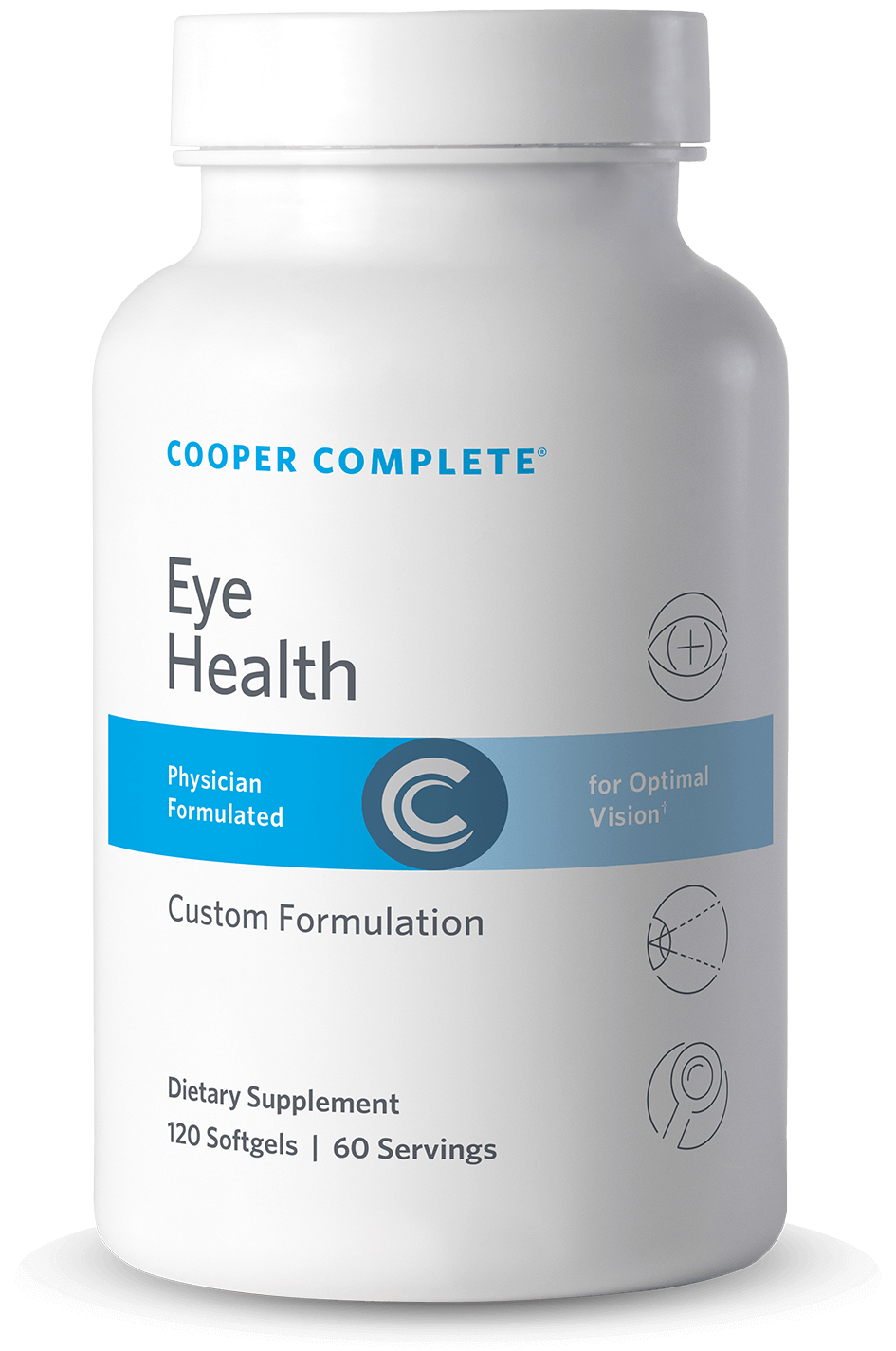Discover Vitamins And Supplements For Eye Health

Nutrition certainly plays a factor in maintaining proper eye health. Through diet and supplementation, a combination of vitamins and minerals may be key to meeting your eyes’ specific set of nutrient needs and preventing the onset or progression of vision loss.

Natural Vitamin C Supplement
Natural Vitamin C Supplement contains 850 mg of vitamin C (as calcium and magnesium ascorbates), plus citrus bioflavonoids to support cells, immune health, and healing.†
$29.98 Add to cartVitamin C for Protection Against Free Radical Damage
Age-related macular degeneration (AMD) is a condition of irreversible vision loss, typically seen in individuals over 60, caused by the deterioration of the macula, the central point of the retina. Vitamin C is a powerful antioxidant that protects the eyes against damaging free radicals and reduces the risk of this condition progressing by 25 percent. It is also necessary for the production of the protein collagen, which provides structure to the eye’s cornea and sclera.
Vitamin C also helps lower one’s risk of developing cataracts, yet another primary cause of vision loss due to blurry, cloudy vision. One observational study showed a significant 75 percent reduction in risk of developing cataracts with daily vitamin C supplementation of more than 490 mg as opposed to those who only took 125 mg or less.
Foods high in vitamin C such as citrus and tropical fruits, bell peppers, broccoli, and kale are beneficial additions to daily supplementation of vitamin C for improved eye health.
Vitamin E to Help Reduce Imbalance of Free Radicals and Antioxidants
Like vitamin C, vitamin E is another powerful antioxidant that specifically protects cells in your body, including your eyes, from harmful, unstable molecules of free radicals. With many eye health conditions and diseases associated directly with oxidative stress – which is an imbalance between antioxidants and free radicals in the body – supplementation of these antioxidants is vital to limit the worsening of eye conditions.
Studies have found people with higher dietary intakes of vitamin E, 20 mg (30 IU) a day, lower their risk of developing AMD by 20 percent compared to those with diets that contain lower vitamin E intake. A diet rich in vitamin E including foods such as salmon, avocado, and leafy green vegetables is recommended to maintain adequate eye health and vision.
Supplements for Eye Health in Cooper Complete |
|||||
|---|---|---|---|---|---|
| VITAMIN INGREDIENT |
EYE HEALTH |
ORIGINAL MULTIVITAMIN |
BASIC ONE MULTIVITAMIN |
NATURAL VITAMIN C |
|
| Vitamin C | 350 mg | 500 mg | 150 mg | 850 mg | |
| Vitamin E | 134 mg | 134 mg | 134 mg | – | |
| Zinc | 25 mg | 15 mg | 15 mg | – | |
| Copper | 2 mg | 2 mg | – | – | |
| Bilberry | 100 mg | – | – | – | |
| Lutein | 10 mg | 6 mg | – | – | |
| Zeaxanthin | 2 mg | 0.4 mg | – | – | |
A Cautionary Word About Zinc
An essential mineral, zinc also supports healthy immune function and overall health. Research suggests zinc combined with other antioxidants is helpful in slowing the progression of Age-Related Macular Degeneration (AMD), the leading cause of blindness in older Americans in the United States.† Because of this, any list of beneficial supplements for eye health will likely include zinc. However, too much of a good thing can be harmful. Chronic over-supplementation with zinc can lead to copper deficiency, as high levels of zinc decrease the body’s ability to absorb and use copper. If you are taking Cooper Complete Eye Health and a Cooper Complete multivitamin, do not add standalone Zinc supplements of any kind to your supplement regimen.

Eye Health Supplement
Supports healthy eyes.† Physician formulated Cooper Complete Eye Health Supplement meets AREDS2 recommendation when taken in conjunction with Basic One or Original Multivitamins.
$45.98 Add to cartLutein & Zeaxanthin Help Protect From Harmful UV Rays and Blue Light
Members of the carotenoid family, the supplements lutein and zeaxanthin play an important role in the body’s visual system and overall eye health. Preliminary studies indicate lutein supplements may also help prevent or slow the development of AMD and cataracts.
The most concentrated amount of lutein in the body is in the macular region of the retina. The macula is a small, yellow area near the center of the eye that is sensitive tissue vulnerable to sun damage. Lutein can help protect eye health by filtering harmful excess blue and ultraviolet light, acting as an internal pair of sunglasses. Lutein also shields the macula from getting too much light.
If your family has a history of AMD or if you have any early indicators you may be developing the condition, we recommend adding Cooper Complete Eye Health to your supplement regimen.
In addition, lutein also protects the lens of the eye from light damage, therefore slowing the development of cataracts. Supplementation of lutein may help reduce the risk of severe cataracts, indicating it could improve visual acuity for patients with existing cataracts.
Taking as little as 10 mg of lutein and zeaxanthin daily can yield great benefit, along with including lots of fruits and vegetables in your daily diet to naturally increase these amounts. Consuming five to nine servings of fruits and vegetables is recommended for optimal health. Dark, leafy vegetables such as spinach, kale and collard greens are particularly high in these carotenoids, so are conducive to good eye health.
See For Yourself!
Cooper Complete Eye Health is the ideal product for people with vision and eye health concerns as the product contains these and other ingredients known to support ocular health. Our scientific advisory team developed Eye Health under the assumption adults would take the product with a Cooper Complete multivitamin.
